On September 29, 1862 a group of men in Seneca Falls, New York held an organizational meeting of a McClellan Club. Here’s a report from a Seneca County, New York newspaper in 1862:
Organization of a McClellan Club.
A large number of our citizens responded to the call, published in the last issue of this paper, and convened at Concert Hall, on Monday evening last, for the purpose of organizing a “McClellan Club.” The meeting was organized by the appointment of GEO. PONTIUS as Chairman, and D.H. WILSON and JEREMIAH TRANT as Secretaries. The object of the meeting being stated, on motion, a committee, consisting of Peter H. Van Auken, Aaron Baldwin, John S. Murphy and James D. Pollard, was appointed to draft and submit to the meeting a series of resolutions expressive of the sentiments of those present.
The following resolutions were read and submitted to the meeting by the chairman of the committee:
Resolved, That, as a mark of our respect for the heroic General at the head of the Union Army, this Club shall be known as “The McClellan Club of Seneca Falls,” and its organization shall be maintained until the present rebellion shall be suppressed, its guilty authors punished, and the soldiers of the Union properly rewarded.
Resolved, That the loyal people of this State have entire confidence in the statesmanly and soldierly ability, and exalted patriotism of Generals Halleck and McClellan, and the officers and soldiers co-operating with them; and that we regard all attempts of abolition disunionists or others to embarrass the action of the Generals in command, or to undermine their influence and popularity with the army or the people, as scarcely less atrocious than the rebellion itself.
Resolved, That in view of the distinguished services and responsible position of General McClellan, we indignanily [as printed] deprecate the nomination and election of Governor of this State of the malignant Wadsworth, a man whose principal claim to notoriety consists of his uniform embittered and factious hostility to General McClellan, his superior officer. His nomination, with that of Lyman Tremaine, whose sudden conversion from extreme “dough-faceism” to radical abolitionism reflects alike upon his sincerity and integrity, cannot but be regarded as an intended insult to every democrat and every whig who prizes the Union and the Constitution.
Resolved, That this Club will unanimously support Horatio Seymour and his associates on the Democratic Constitutional Union Ticket at the ensuing election.
Resolved, That the present danger and difficulties which hang over this Republic may, in a great measure be justly attributed to the New York Tribune, and papers and politicians of that stripe and character. – That the speeches of the “little villain” of the New York Times, and his associates in the recent Republican State Convention imputing treasonable sentiments to their political opponents were infamously false and insulting to at least one half of the people of the Northern states, and that taken in connection with the arbitrary arrests and imprisonments of loyal citizens, and the suppression of independent newspapers, have a direct tendency to divide and distract the north, and to discourage enlistments, if not to encourage mutiny and breaches of the public peace, and that in consequence all such disloyal practices ought to stop.
Resolved, That a loyal and constitutional party is at all times promotive of the public good; and that such a party was never more required than when the enormous expenditure of public money tends to fill every department of the government with men intent upon speculation and plunder.
The reading of the resolutions was frequently interrupted by the applause of the audience, and they were unanimously adopted as the sentiments of the meeting, Before their adoption, however, J.T.MILLER, Esq., made a brief and telling speech upon the questions that are now agitating the public mind.
On motion, the Chair was empowered to select a committee of two from each ward to report permanent officers of the Club at Concert Hall, on Wednesday evening, October 8th. The following are the several members of the committee thus appointed: Henry Stowell, P.H. Van Auken, G. Wilcoxen, James D. Pollard, John S. Murphy, L.T. Moore, J. Newbolt.
The Club adjourned to meet at Concert Hall, on Wednesday next, to perfect its organization. The public generally are invited to attend.
The resolutions aim a good deal at the approaching state election. The Constitutional Unionists joined the Democrat convention on September 10, 1862 where Horatio Seymour was nominated for governor.
The Republicans met in Syracuse on September 24th. Henry Jarvis Raymond, the founder of The New-York Times, presided. James Samuel Wadsworth, the gubernatorial nominee, was a political general in charge of the defenses of Washington, D.C. from March until September 1862. President Lincoln sided with Wadsworth at the start of general McClellan’s peninsula campaign and ordered that more troops stay to defend the capital. McClellan had even less soldiers than he would have liked to start an offensive. Lyman Tremain, the Democrat state attorney general as late as 1859, ran for Lieutenant Governor as a Republican.
You can read about the political cartoon at the Library of Congress

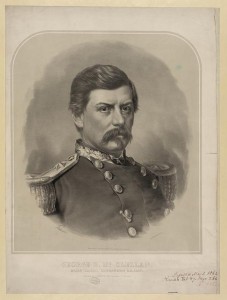
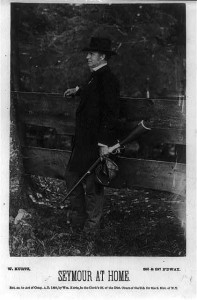
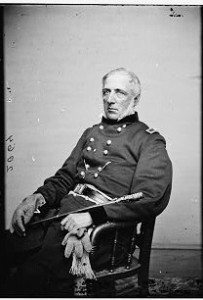
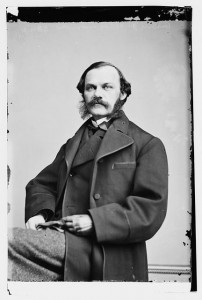
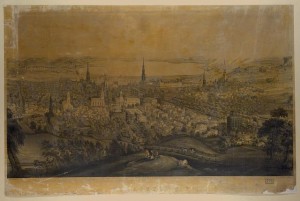
![Breaking that "backbone" (Pub'd. by Currier & Ives, Nassau St., N.Y. [1862 or 1863]; LOC: LC-USZ62-42560) Breaking that "backbone" (Pub'd. by Currier & Ives, Nassau St., N.Y. [1862 or 1863]; LOC: LC-USZ62-42560)](https://www.bluegrayreview.com/wp-content/uploads/2012/10/3a42878r.jpg)